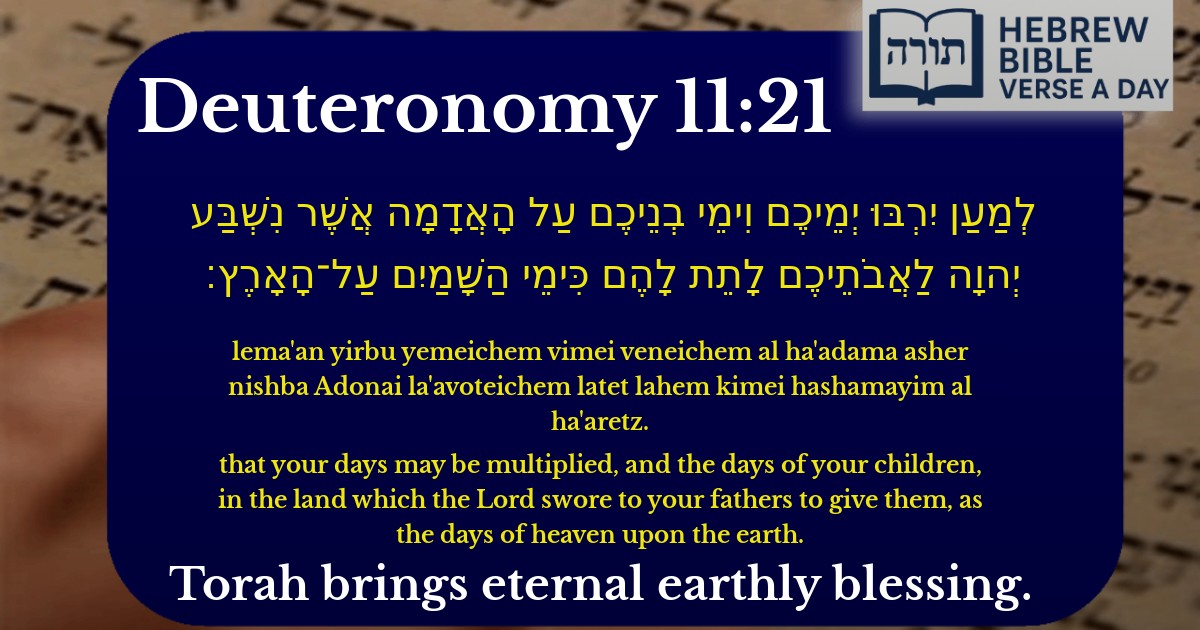Join Our Newsletter To Be Informed When New Videos Are Posted
Join the thousands of fellow Studends who rely on our videos to learn how to read the bible in Hebrew for free!
Hebrew Text
לְמַעַן יִרְבּוּ יְמֵיכֶם וִימֵי בְנֵיכֶם עַל הָאֲדָמָה אֲשֶׁר נִשְׁבַּע יְהוָה לַאֲבֹתֵיכֶם לָתֵת לָהֶם כִּימֵי הַשָּׁמַיִם עַל־הָאָרֶץ׃
English Translation
that your days may be multiplied, and the days of your children, in the land which the Lord swore to your fathers to give them, as the days of heaven upon the earth.
Transliteration
Lema'an yirbu yemeichem vimei veneichem al ha'adama asher nishba Adonai la'avoteichem latet lahem kimei hashamayim al ha'aretz.
Hebrew Leining Text
לְמַ֨עַן יִרְבּ֤וּ יְמֵיכֶם֙ וִימֵ֣י בְנֵיכֶ֔ם עַ֚ל הָֽאֲדָמָ֔ה אֲשֶׁ֨ר נִשְׁבַּ֧ע יְהֹוָ֛ה לַאֲבֹתֵיכֶ֖ם לָתֵ֣ת לָהֶ֑ם כִּימֵ֥י הַשָּׁמַ֖יִם עַל־הָאָֽרֶץ<sup class="footnote-marker">*</sup><i class="footnote">(בספרי תימן הָאָֽרֶ<big>ץ</big> בצד״י גדולה)</i>׃ <span class="mam-spi-samekh">{ס}</span>
לְמַ֨עַן יִרְבּ֤וּ יְמֵיכֶם֙ וִימֵ֣י בְנֵיכֶ֔ם עַ֚ל הָֽאֲדָמָ֔ה אֲשֶׁ֨ר נִשְׁבַּ֧ע יְהֹוָ֛ה לַאֲבֹתֵיכֶ֖ם לָתֵ֣ת לָהֶ֑ם כִּימֵ֥י הַשָּׁמַ֖יִם עַל־הָאָֽרֶץ*(בספרי תימן הָאָֽרֶץ בצד״י גדולה)׃ {ס}
🎵 Listen to leining
Parasha Commentary
📚 Talmud Citations
This verse is quoted in the Talmud.
📖 Kiddushin 39b
The verse is cited in a discussion about the rewards for fulfilling commandments, particularly the commandment of honoring one's parents, and how it leads to long life in the land.
📖 Sotah 11a
The verse is referenced in the context of discussing the merits of the Israelites in Egypt and how their adherence to certain practices contributed to their longevity and inheritance of the land.


Understanding the Verse in Context
The verse (Devarim 11:21) appears in the second paragraph of the Shema, emphasizing the reward for fulfilling mitzvot—particularly the mitzvah of Torah study and teaching it to one's children. The promise of long life in the Land of Israel is contingent upon loyalty to Hashem's commandments.
Rashi's Explanation
Rashi (Devarim 11:21) interprets "that your days may be multiplied" as referring to the World to Come (Olam Haba), where time is eternal. However, "the days of your children" refers to longevity in this world (Olam Hazeh). The dual promise signifies that observance of mitzvot brings both material and spiritual blessings.
Rambam's Perspective
In Hilchot Teshuva (9:1), Rambam explains that the reward for mitzvot is not merely physical longevity but also the merit to dwell in Eretz Yisrael, the land where one can best serve Hashem. The phrase "as the days of heaven upon the earth" suggests that a life of Torah in Eretz Yisrael elevates earthly existence to a heavenly quality.
Midrashic Interpretation
The Midrash (Sifrei Devarim 47) connects this verse to the mitzvah of mezuzah, which is mentioned earlier in the passage. It teaches that the fulfillment of this mitzvah safeguards the home and ensures continuity for future generations in the Land.
Symbolism of "Days of Heaven Upon Earth"
Practical Implications
The verse underscores the inseparable bond between Torah observance, the Land of Israel, and Jewish continuity. As taught in Pirkei Avot (2:7), one who learns Torah in Eretz Yisrael merits a portion in both this world and the next, fulfilling the dual promise of the verse.